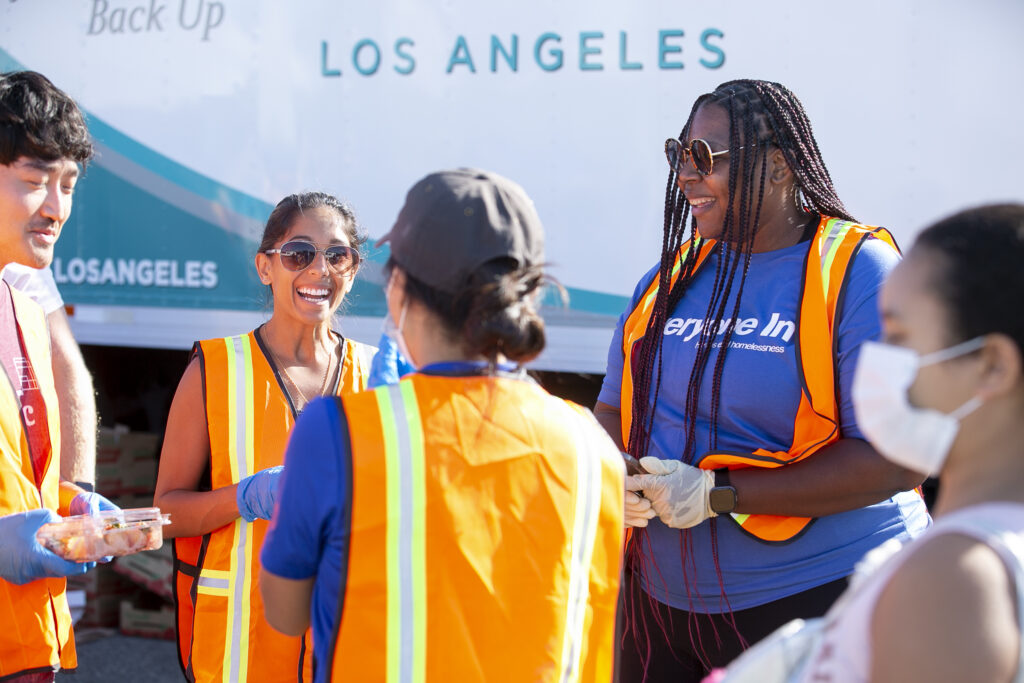United Way of Greater Los Angeles proudly announces the distribution of over $30 million through the Los Angeles Emergency Food and Shelter Program (EFSP) program to 190 organizations, serving hundreds of thousands of people in need of food and shelter across the region.
Since its inception in 1983, the program has helped distribute over $200 million in EFSP funding to organizations in L.A. County. This federal program supplements and expands the work of local social service organizations to assist people experiencing a severe economic crisis.
“This helps put food on children’s plates, keeps families at risk of homelessness housed through emergency housing, and helps create an essential safety net at an uncertain time,” said Elise Buik, President and CEO of United Way of Greater Los Angeles. “We are honored to help community organizations provide essential food and shelter for our most vulnerable neighbors and applaud our partners in Washington, D.C. for increasing their commitment to L.A. County this year and we must sustain this level of support”
EFSP supplements and expands the work of local social service organizations, including nonprofit and governmental agencies that provide meals, food banks, mass and emergency shelters, rental or mortgage assistance, and more.
This year, UWGLA disbursed a total of $30,929,305 to 190 community organizations, including 49 new grantees such as Los Angeles Room & Board, Inclusive Action for the City and Baby2Baby, as well as three community college foundations.
“We are so appreciative of the EFSP grant provided to the Los Angeles City College (LACC) Foundation to support the LACC students with the funds that will increase Los Angeles City College’s capacity to support students as they seek to improve their lives through postsecondary education,” said Daren Lynne, Director of Special Projects & Academic Support for the Los Angeles City College Foundation, one of the awardees.
LACC is a public, two-year community college located in a diverse and densely populated area of Los Angeles. As of fall 2020, more than 19,000 students enrolled in LACC courses. Los Angeles Community College District (LACCD) data indicates that nearly 65 percent of LACC students cannot consistently afford adequate food, and as many as 20 percent experience homelessness while enrolled at LACC.
Lynne said that the EFSP funds received through UWGLA help LACC provide food assistance to about 6,500 students per semester. She explained that according to studies conducted by LACCD and The Hope Lab, 65% of LACC students do not have adequate food on a consistent basis.
“So many of our students need food support. Our student populations include former foster youth, veterans, single parents, homeless, returning citizens, undocumented, and underemployed,” Lynne added.
The EFSP program has brought millions of dollars into L.A. County over the years to provide food and shelter to hundreds of thousands of people, including those at risk of homelessness.
Project Angel Food, a nonprofit in Los Angeles that delivers over one million free medically tailored-meals each year to men, women, and children affected by life-threatening illnesses, has prioritized providing rental assistance in chronically underfunded communities in South Los Angeles and the Antelope Valley.
“We have never been able to fund as many different organizations as we did this funding cycle, and we know our impact will be greater than ever before,” said Robert Boller, Director of Programs for Project Angel Food. “Everyone in Los Angeles is feeling the effects of our homeless crisis. Hopefully, 2022 will be remembered as the year we finally begin to see this crisis turn around.”
